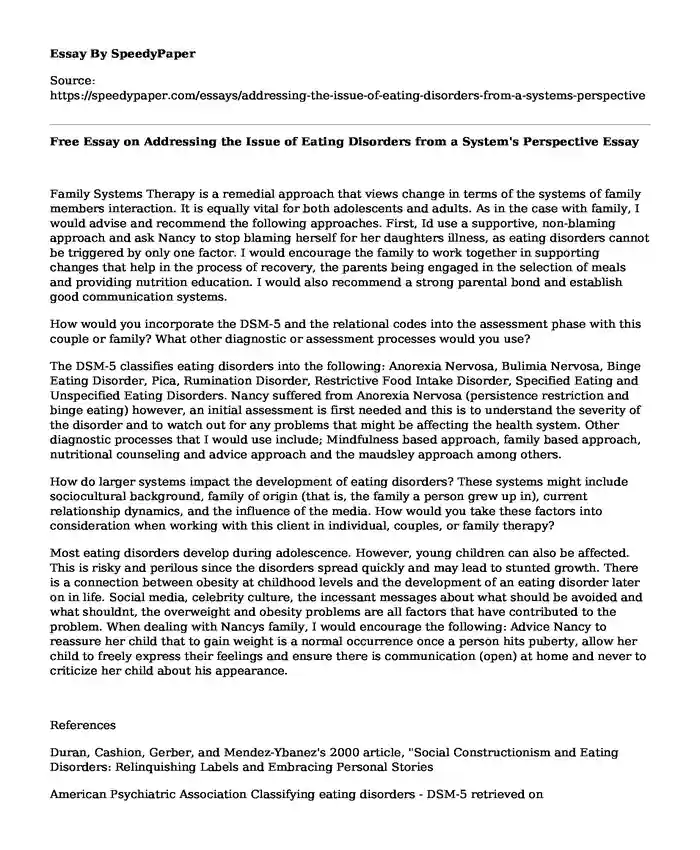
| Type of paper: | Essay |
| Categories: | Systems thinking Counseling Mental health Disorder |
| Pages: | 2 |
| Wordcount: | 463 words |
Family Systems Therapy is a remedial approach that views change in terms of the systems of family members interaction. It is equally vital for both adolescents and adults. As in the case with family, I would advise and recommend the following approaches. First, Id use a supportive, non-blaming approach and ask Nancy to stop blaming herself for her daughters illness, as eating disorders cannot be triggered by only one factor. I would encourage the family to work together in supporting changes that help in the process of recovery, the parents being engaged in the selection of meals and providing nutrition education. I would also recommend a strong parental bond and establish good communication systems.
How would you incorporate the DSM-5 and the relational codes into the assessment phase with this couple or family? What other diagnostic or assessment processes would you use?
The DSM-5 classifies eating disorders into the following: Anorexia Nervosa, Bulimia Nervosa, Binge Eating Disorder, Pica, Rumination Disorder, Restrictive Food Intake Disorder, Specified Eating and Unspecified Eating Disorders. Nancy suffered from Anorexia Nervosa (persistence restriction and binge eating) however, an initial assessment is first needed and this is to understand the severity of the disorder and to watch out for any problems that might be affecting the health system. Other diagnostic processes that I would use include; Mindfulness based approach, family based approach, nutritional counseling and advice approach and the maudsley approach among others.
How do larger systems impact the development of eating disorders? These systems might include sociocultural background, family of origin (that is, the family a person grew up in), current relationship dynamics, and the influence of the media. How would you take these factors into consideration when working with this client in individual, couples, or family therapy?
Most eating disorders develop during adolescence. However, young children can also be affected. This is risky and perilous since the disorders spread quickly and may lead to stunted growth. There is a connection between obesity at childhood levels and the development of an eating disorder later on in life. Social media, celebrity culture, the incessant messages about what should be avoided and what shouldnt, the overweight and obesity problems are all factors that have contributed to the problem. When dealing with Nancys family, I would encourage the following: Advice Nancy to reassure her child that to gain weight is a normal occurrence once a person hits puberty, allow her child to freely express their feelings and ensure there is communication (open) at home and never to criticize her child about his appearance.
References
Duran, Cashion, Gerber, and Mendez-Ybanez's 2000 article, "Social Constructionism and Eating Disorders: Relinquishing Labels and Embracing Personal Stories
American Psychiatric Association Classifying eating disorders - DSM-5 retrieved on http://www.eatingdisorders.org.au/eating-disorders/what-is-an-eating-disorder/classifying-eating-disorders/dsm-5
Cite this page
Free Essay on Addressing the Issue of Eating Disorders from a System's Perspective. (2019, Sep 26). Retrieved from https://speedypaper.com/essays/addressing-the-issue-of-eating-disorders-from-a-systems-perspective
Request Removal
If you are the original author of this essay and no longer wish to have it published on the SpeedyPaper website, please click below to request its removal:
- Literature Review Essay Sample on BOMB: The Race to Build and Steal
- Anthropology Essay Sample: The Machine Zone
- Reading Profile of a Student, Free Essay Example
- Free Essay: How Competition Influences Mobile Communication and Computing Infrastructure in Dominica
- Free Essay with Comprehensive Analysis of the Nissan Case Study
- THE ORACLE ERP SOFTWARE
- Essay Sample on Hamilton's Policies for American Economic Growth in the Early National Period
Popular categories




